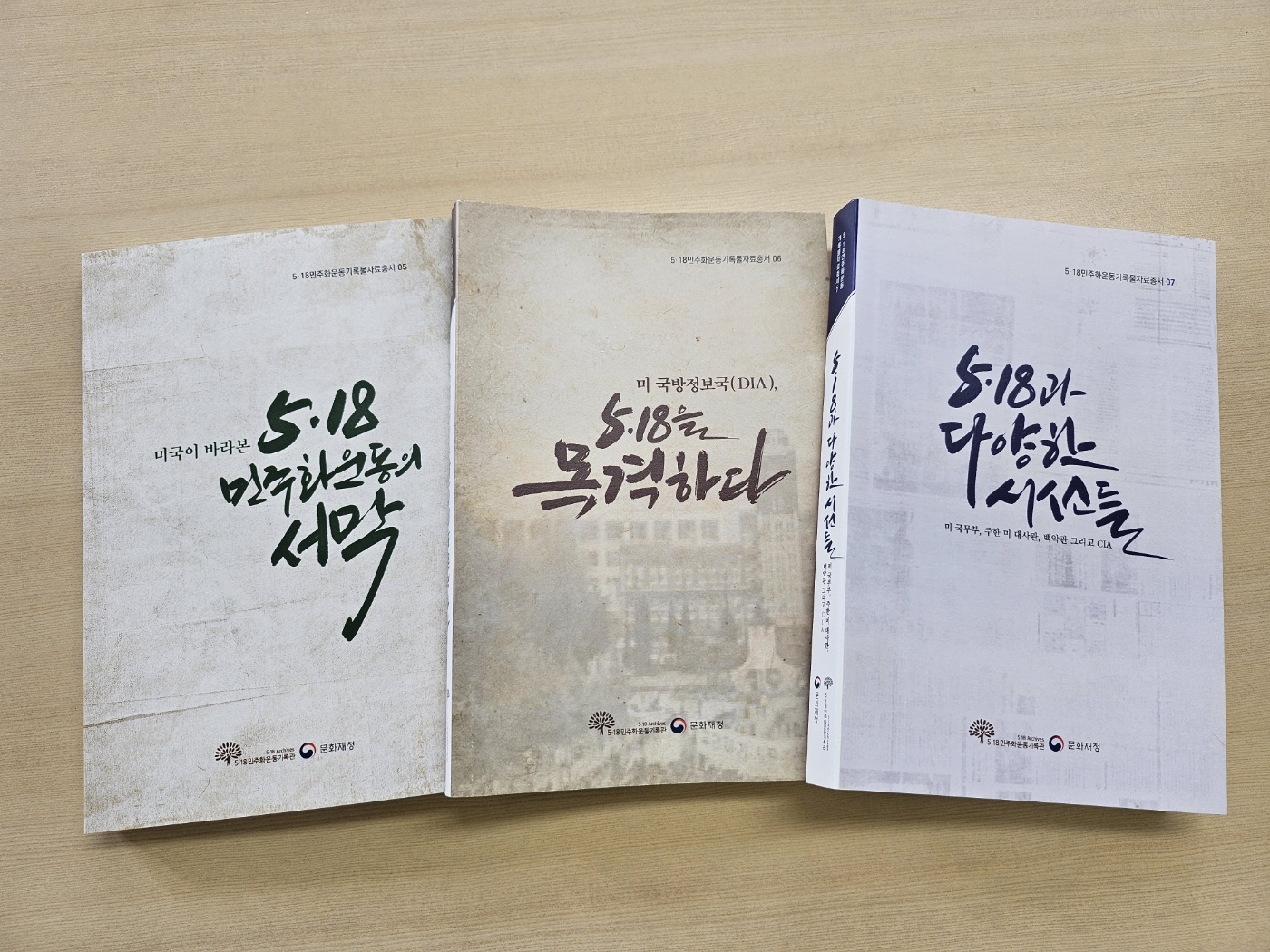
New, Rare and Unreleased Material from the DMZ Empire
New, Rare and Unreleased Material from the DMZ Empire
The Cherokee Files
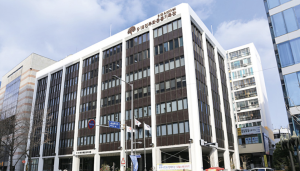
U.S. POLICY IN SOUTH KOREA IN 1979 AND 1980
The “Cherokee Files” archives are my collection of declassified documents on US policy in South Korea in 1979 and 1980. They were obtained between 1991 and 2006 from the Department of State, the Department of Defense, the National Security Council, and the Central Intelligence Agency. They focus on the US response to the assassination of Park Chung Hee, Chun Doo Hwan’s rolling coup, the Gwangju Uprising, and U.S. actions and policies during that time. These were first released in 1994 in the New York Journal of Commerce and Seoul’s Sisa Journal. Many of them are available here for the first time in the USA. All the original, hard-copy files are permanently stored, as I received them, at the 5.18 Archives in Gwangju City, South Korea (pictured). My great thanks to Lee Jae-Eui, the author of Kwangju Diary, for his assistance in interpreting and understanding the documents on the 1980 uprising.
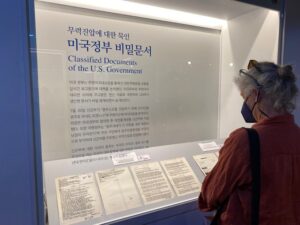
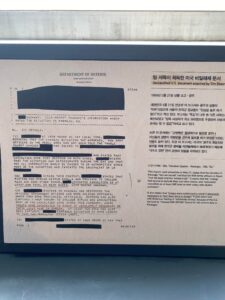
Origins: In 1989, the National Assembly of a newly democratic South Korea launched the first public investigation into the 1980 Gwangju Uprising. As part of its probe, the assembly asked the U.S. government to allow the testimony of two of the key US figures in American decision-making at the time, Ambassador William Gleysteen and General John Wickham, the U.S. and U.N. Commander in Korea (these two men, with CIA Station Chief William Brewster, made up the “country team” that managed American policy in the period from Park’s 1979 assassination to Chun’s 1980 takeover) The administration of George H.W. Bush refused the National Assembly’s request for the testimony, and instead ordered the National Security Council to write a “White Paper” on US policy in Korea in 1979 and 1980. When that paper (attached in this section) came out, I doubted many of its conclusions, and went through the document taking note of every meeting and policy paper mentioned by the authors. I used that information to craft my FOIA request and, once I obtained them, interviewed many of the individuals identified as key players. From that research, I wrote my stories for the JOC and Sisa, which published them in February 1994.
With a few exceptions, the documents described below are listed by box and file as they can be found in Gwangju’s 5.18 Archives.

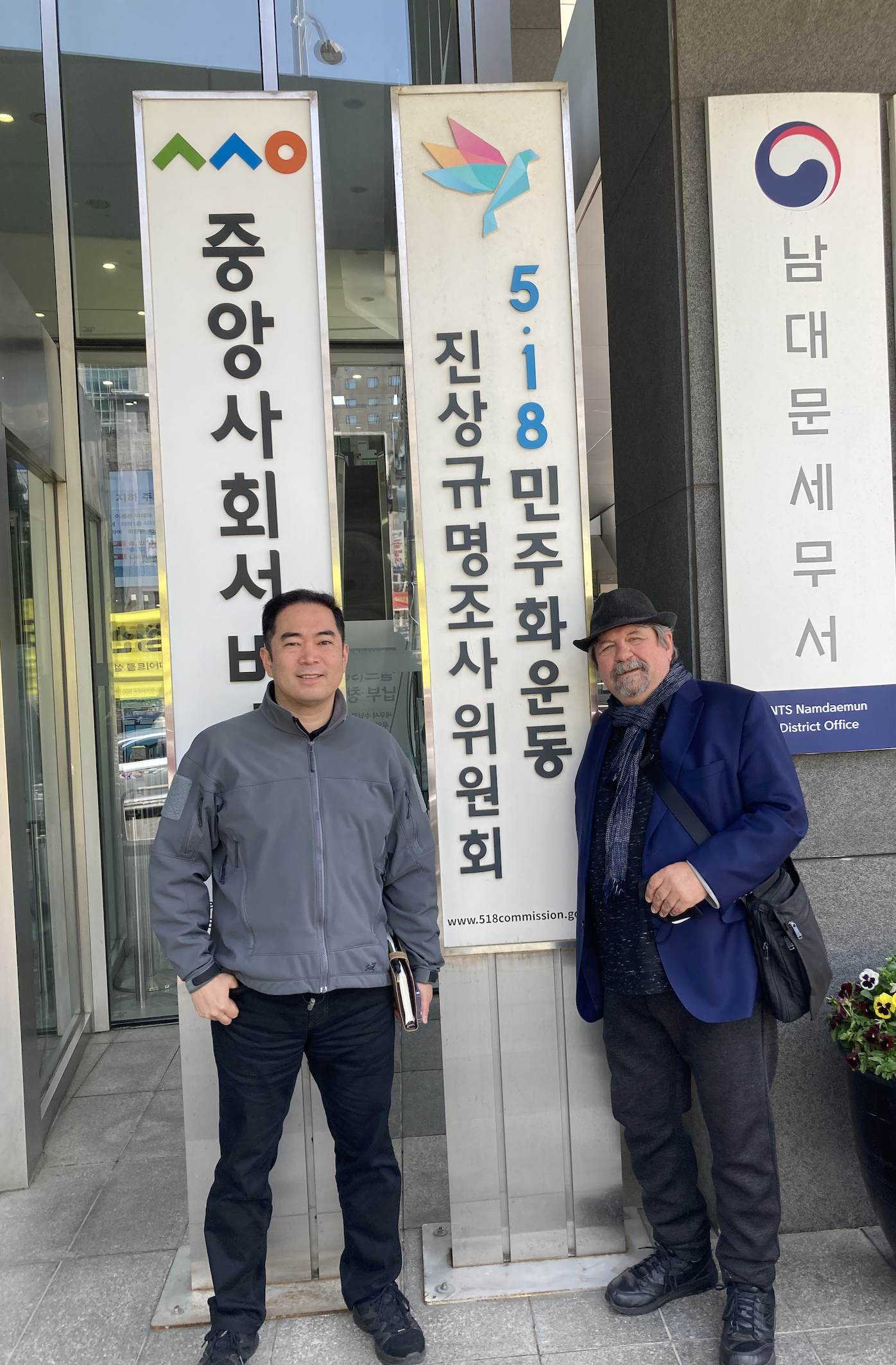
New Gwangju FOIA Documents Now Available
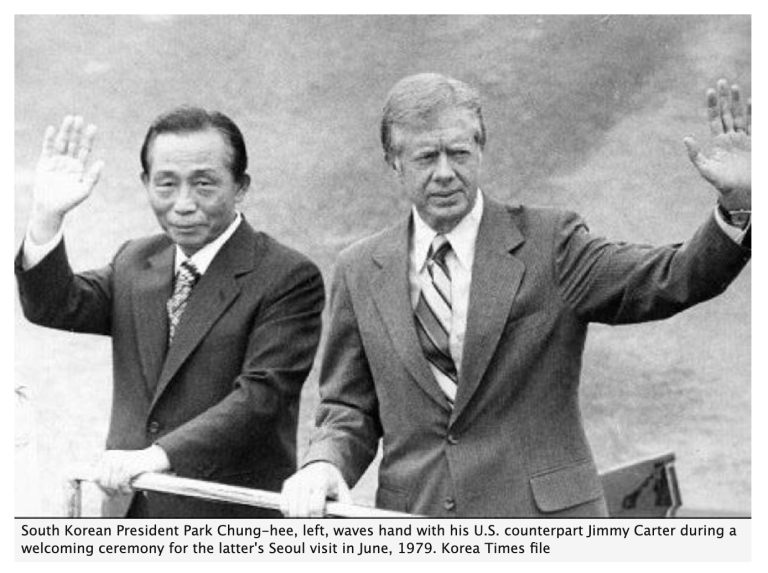
Jimmy Carter, the Assassination of Park Chung Hee, and the Pusan-Masan Uprising of 1979
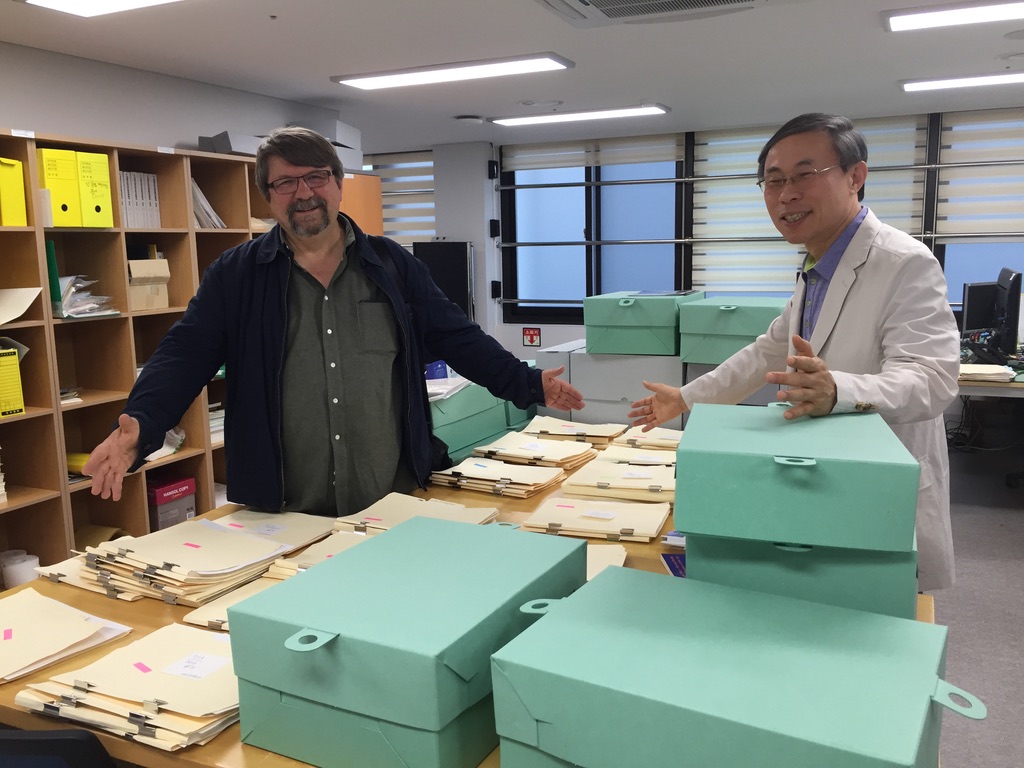
Key U.S. documents on Gwangju and the Rise of Chun
Cherokee Files: Key Document on Park’s Assassination
The assassination of Park Chung Hee on the night of October 26, 1979, came as a deep shock to Washington and U.S. diplomats and intelligence officers in Seoul. For years, they’d been 10/28/1979 – Ambassador Gleysteen’s memo, “Initial reflections on…
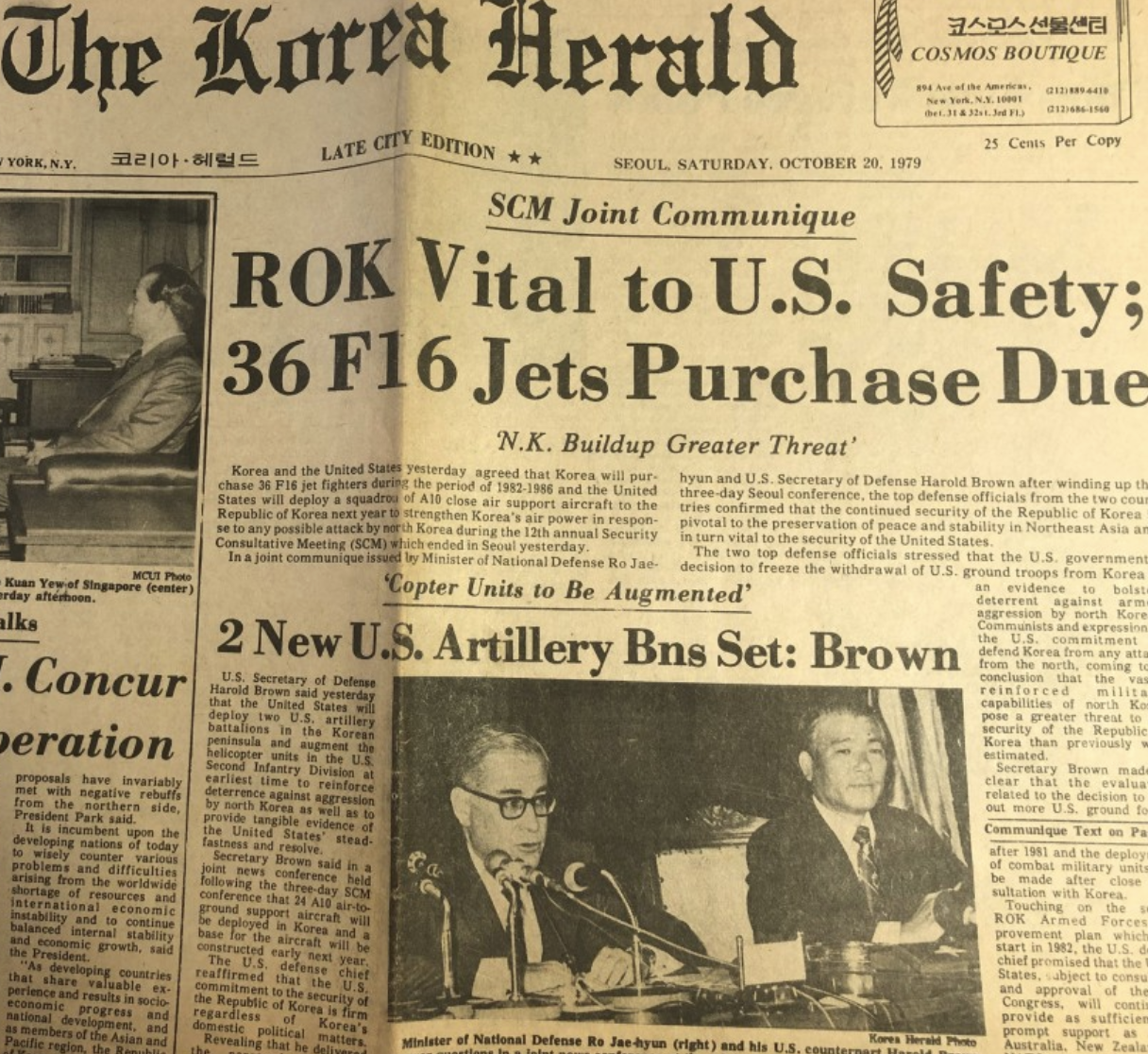
Gleysteen’s talks with Chun Doo Hwan
BOX 2, FILE 7 (1979-1980) Ambassador Gleysteen’s discussions with Chun Doo Hwan; Kim Dae Jung’s role in politics; the pace of democratization. These documents written by US Ambassador William Gleysteen are primarily from 1979 and the summer and fall of…
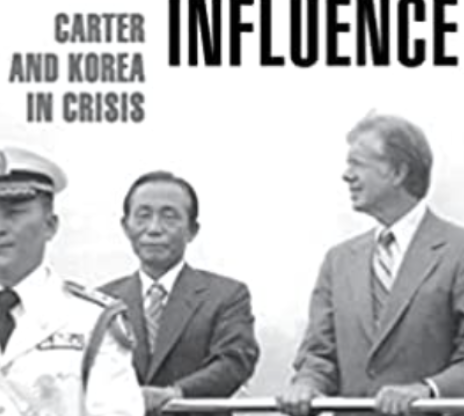
Ambassador Gleysteen: Key Policy Documents
BOX 2, FILE 6 (1979-1980) This file contains key documents written by US ambassador William Gleysteen to the State Department in Washington during the critical months from November 1979 to May 1980. They are significant because Gleysteen was the head…
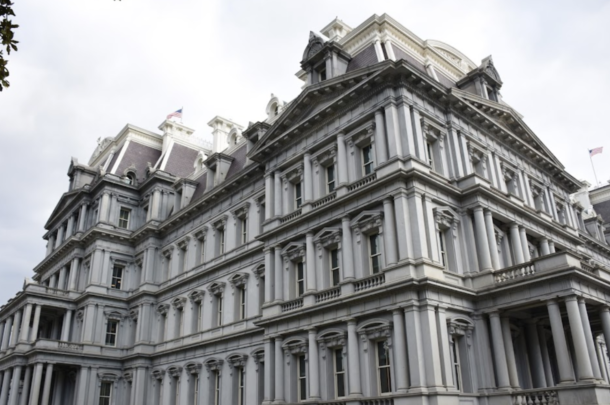
White House: “The first priority is the restoration of order in Kwangju.”
BOX 2, FILE 4 (May 22, 1980) This document from the National Security Council provided the full notes to the May 22, 1980, meeting where the Carter administration agreed to deploy military force to end the Gwangju Uprising. The participants…
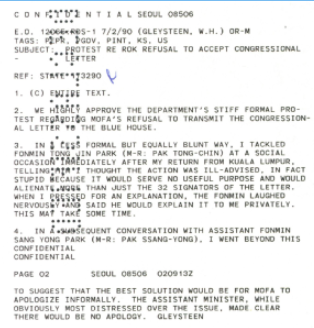
ROK Diplomats Refuse to Send Congressional Letter to Blue House
BOX 2, FILE 3 (1980) July 1980 – These documents describe back-and-forth communication between the US Embassy in Seoul and the South Korean Ministry of Foreign Affairs about MOFA’s refusal to transmit to the Blue House a letter signed by…
Smoking Guns: U.S. Intervention Exposed
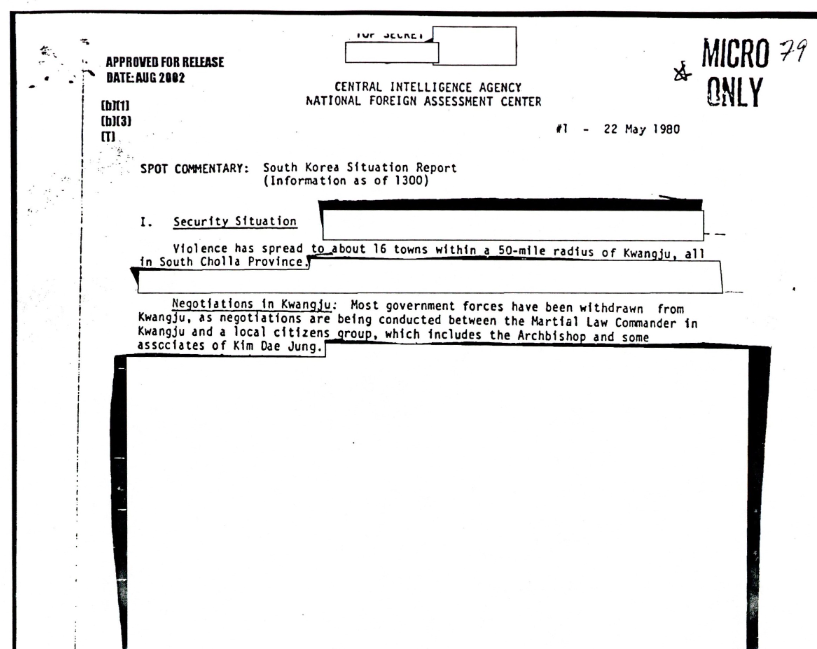
CIA Reports from Gwangju May 21-22, 1980
May 21 and May 22, 1980, were two of the most critical days of the Gwangju Uprising. On May 21, Chun Doo Hwan’s martial law forces opened fire on hundreds of citizens surrounding the old Provincial Capital building; 60 people…
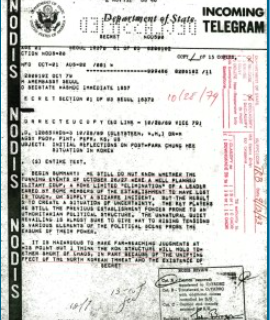
Gwangju Archives | Cherokee Files | 1979-1980
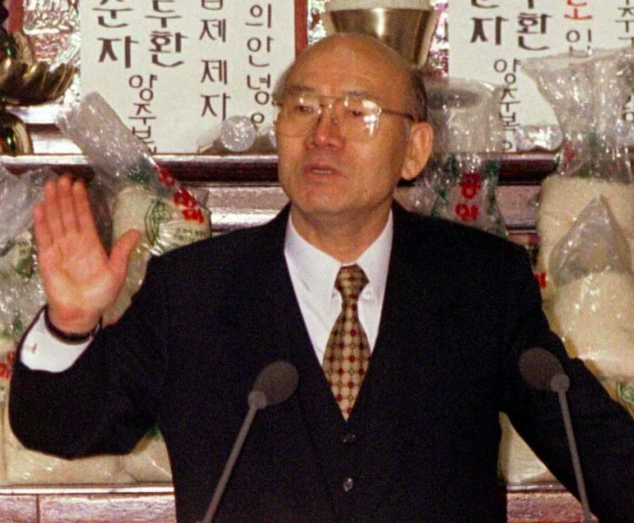
Gwangju Archives | Aftermath | Arrests | Chun Visit
Gwangju Archives | Pentagon/DIA Reports
This is an online database of the 4,000 declassified US government documents on the US role in the Gwangju Uprising of 1980. The original copies of the documents known in Korea as the “Cherokee File,” are permanently stored and available for…
Gwangju Archives | First US Reports
This is the first posting of what will be an online database of the 3,500 declassified US government documents on the US role in the Gwangju Uprising of 1980. The original copies of the documents known in Korea as the “Cherokee…
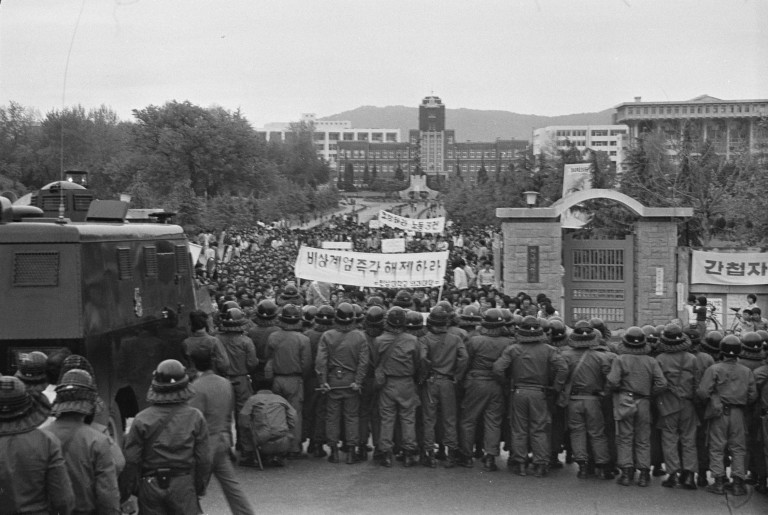
Gwangju Presente!
May 18 marks the 40th anniversary of the Gwangju Massacre and Uprising, which shook the foundations of South Korea in 1980 and marked the beginning of the country’s long march towards democracy. I’ve written extensively about Gwangju and the unfortunate…
Gwangju: Preserving the vicious nature of martial law, 1980
I spent most of the last three weeks in South Korea, primarily in Gwangju, Jeju and Seoul. I was invited to Gwangju by the city, along with three American journalists who witnessed the uprising and the final military takeover on…
My Gwangju FOIA Documents Get a Home – In Gwangju
This week I agreed to donate my entire collection of Freedom of Information Act (FOIA) documents on U.S. policy in South Korea from 1979 to 1980 to the city of Kwangju. Mayor Yoon and I worked out the agreement on May 18…
North Korea’s KCNA cites Kwangju docs – inaccurately
I got a surprise today. North Korea’s Korea Central News Agency (KCNA) cited my documents on the 1980 Kwangju Uprising in South Korea. The citation appeared in a story looking back at the event and exploring its significance in recent…
May 18, 1980 – Presente!
The Kwangju Uprising of 1980, and the U.S. response, was a turning point in South Korean history as well as for the Cold War in Asia. It’s being commemorated in Korea today. To mark the date, please read Hankyoreh‘s moving…
Richard Holbrooke RIP
One of America’s most experienced diplomats, Richard Holbrooke, passed away today after suffering heart problems over the weekend. Tonight the cable news shows are devoting much time to his career, focusing primarily on his early years as a foreign service…
Kwangju Declassified: CIA Redux/Washington Post
Jeff Stein’s SpyTalk: CIA documents detail false predictions on Korea. In which SpyTalk actually advances the story by adding details from retired Army General John Wickham, who was the US commander in South Korea during and after the Kwangju Peoples’…
Kwangju Declassified: The CIA Got it Wrong
The Lasting Significance of Kwangju: Foreign Policy in Focus, June 1, 2010. Last month marked the 30th anniversary of the Kwangju Citizens’ Uprising in South Korea, a pivotal event that inspired the Korean democratic movement through its ultimate victory in…
Kwangju Declassified: CIA on Park, June 1979
This CIA report, dated June 1979, was probably written as background material for President Jimmy Carter’s 1979 visit to Seoul. It was obtained by Tim Shorrock under the Freedom of Information Act in 2006; the initial FOIA request to the…
Kwangju Declassified: Holbrooke’s Legacy
One of the most important documents I obtained in my 15-year quest to unearth the US role in South Korea in 1979 and 1980 were the minutes to a White House meeting that took place on May 22, 1980. At…